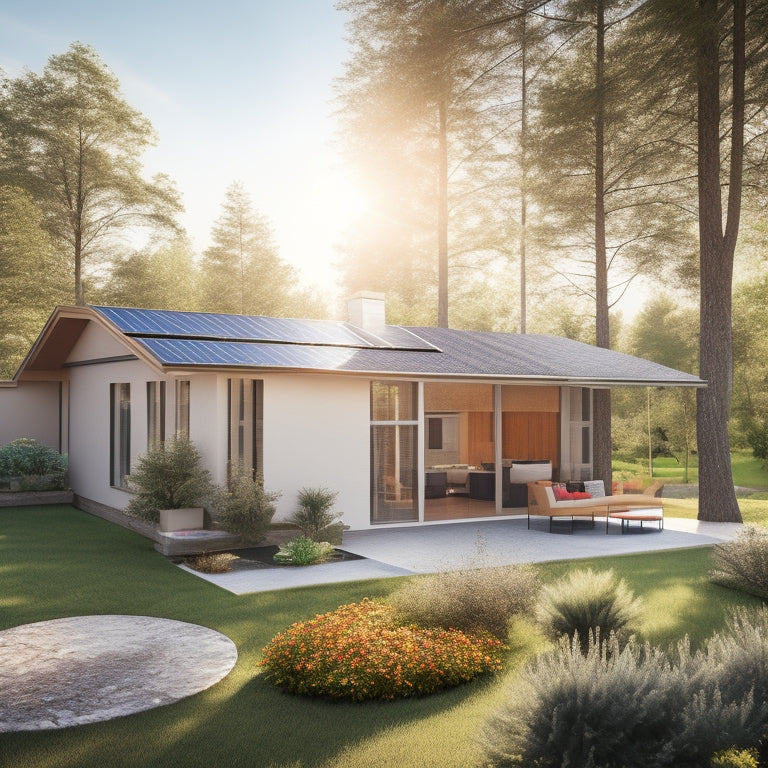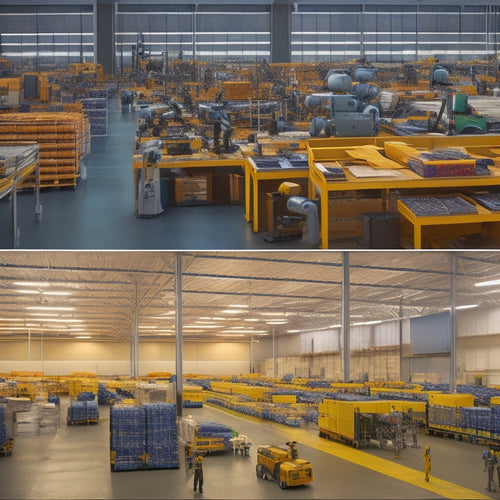
Get Affordable Solar Panels for Your Home Online
Share
You can find and compare affordable solar panels for your home online, with top retailers like Amazon, Home Depot, and Lowe's offering a wide range of options with competitive pricing, varying features, and warranties. Online shopping lets you easily compare prices, features, and warranties, and consider incentives, financing options, and total cost of ownership. You'll want to research retailers' return and refund policies, read reviews, and verify product information to make an informed decision. As you explore your options, you'll uncover more details to help you find the best fit for your home and budget.
Key Takeaways
• Compare prices, features, and warranties of solar panels online to find affordable options for your home.
• Consider total cost of ownership, including upfront cost, financing, and incentives, to get the best deal.
• Research top online retailers like Amazon, Home Depot, and Lowe's for competitive pricing and a wide range of solar panels.
• Evaluate system size, energy efficiency, and panel longevity to determine the best configuration for your energy needs.
• Verify certifications, warranties, and return policies before making a purchase to ensure a durable and reliable solar panel system.
Benefits of Online Solar Shopping
Moreover, when you shop for solar panels online, you can easily compare prices, features, and warranties of various models, allowing you to make an informed decision that meets your energy needs and budget.
With virtual convenience at your fingertips, you can browse through a vast array of solar panels from the comfort of your own home. This digital platform enables you to find personalized solutions tailored to your specific energy requirements.
Embracing an eco-friendly mindset, you'll appreciate the reduced carbon footprint associated with online shopping. Additionally, developing your digital literacy skills will empower you to navigate online marketplaces with confidence.
By reading online reviews from verified customers, you'll gain valuable insights into the performance and reliability of various solar panels. This wealth of information will help you make a well-informed decision, ensuring you get the best value for your money.
Finding the Best Solar Deals
You can uncover the best solar deals by researching and comparing prices, incentives, and financing options from various manufacturers, installers, and online marketplaces. This enables you to make an informed decision and maximize your savings. To facilitate your search, consider the following key factors:
| Deal Comparison | Solar Incentives | Financing Options |
|---|---|---|
| Price per watt | Federal Tax Credit | Cash Purchase |
| System size and quality | State and Local Rebates | Loan Options |
| Warranty and maintenance | Net Metering Laws | Lease Options |
| Installation company reputation | Property Tax Exemptions | Power Purchase Agreements |
| Customer reviews and ratings | Sales Tax Exemptions |
When comparing deals, look for the best combination of upfront cost, financing options, and incentives. Be sure to factor in the total cost of ownership, including maintenance and warranty expenses. By carefully evaluating these factors, you can find the most affordable and suitable solar solution for your home.
Top Online Solar Panel Retailers
Shopping online for solar panels can land you a better deal, as top online retailers like Amazon, Home Depot, and Lowe's often offer competitive pricing, convenient shipping, and expert customer support. These retailers have formed partnerships with leading solar manufacturers, ensuring you get high-quality products at an affordable price. You can read Solar Reviews from other customers to help you make an informed decision.
When shopping online, you'll have access to a wide range of solar panels from various brands, including Panasonic, Tesla, and SunPower. You can compare prices, features, and warranties to find the best fit for your home. Retailer Partnerships with manufacturers also enable you to take advantage of promotions, discounts, and bundle deals.
Some retailers even offer free shipping, installation services, and maintenance support. With online retailers, you can enjoy the convenience of shopping from home, 24/7 customer support, and often, a more extensive range of products than what's available in physical stores. By choosing the right online retailer, you can get the solar panels you need to power your home efficiently and affordably.
Tips for Buying Solar Online
Before making a purchase, research the retailer's return and refund policies to confirm you're protected in case the solar panels don't meet your expectations. You'll want to verify you have a clear understanding of their process for handling returns, replacements, and refunds. This will give you peace of mind and protect your investment.
Next, read Solar Reviews from multiple sources to get a well-rounded view of the retailer's products and customer service. Be wary of fake reviews and look for red flags, such as overly positive language or repetitive comments. Legitimate reviews will provide a balanced view, highlighting both strengths and weaknesses.
When buying online, be cautious of Online Scams. Be suspicious of extremely low prices or unrealistic promises. Reputable retailers will provide detailed information about their products, including certifications and warranties. Don't hesitate to reach out to their customer support team with questions or concerns.
Understanding Solar Panel Pricing
When you're shopping for affordable solar panels, you'll quickly realize that pricing can vary greatly depending on several key factors.
You'll need to take into account the system size that's right for your home, as well as the efficiency and quality of the panels themselves.
Additionally, you'll want to examine warranties and durability to guarantee your investment will pay off in the long run.
System Size Matters
Your solar panel system's size has a significant impact on the overall cost, with larger systems typically priced higher due to the increased number of panels and hardware required. When exploring options for your home, it's crucial to determine the best configuration for your energy needs.
A larger system doesn't always mean more energy efficiency, as it depends on various factors, including your roof's size, local building codes, and the amount of energy you want to generate.
To maximize energy efficiency, you'll want to take into account the size of your system in relation to your energy consumption. A system that's too small won't generate enough power, while one that's too large will be a waste of resources. By finding the ideal balance, you can achieve peak energy efficiency and reduce your reliance on the grid.
When evaluating system sizes, consider your energy usage patterns, roof orientation, and local solar irradiance to determine the most suitable system size for your home. By doing so, you'll be able to harness the power of solar energy while minimizing costs and maximizing your return on investment.
Efficiency and Quality
High-efficiency solar panels, boasting superior quality and premium materials, come at a higher price point due to their advanced technology and superior performance. When you're shopping for solar panels, you'll want to take into account the efficiency and quality of the panels, as they directly impact the energy conversion rate and overall panel performance.
Here are key factors to take into consideration when evaluating efficiency and quality:
-
Energy Conversion Rate: Look for panels with high energy conversion rates, typically above 20%. This guarantees you're getting the most power out of your solar panels.
-
Panel Materials: Premium materials, such as high-purity silicon, contribute to improved efficiency and longer lifespan.
-
Temperature Coefficient: A lower temperature coefficient indicates better performance in high-temperature conditions, ensuring consistent energy production.
- Certifications and Compliance: Make sure the panels meet industry standards, such as UL and IEC certifications, guaranteeing quality and reliability.
Warranties and Durability
A solar panel's warranty and durability greatly impact its overall value, and you should carefully evaluate these factors to guarantee your investment lasts for years to come.
When evaluating warranties, look for manufacturers that offer thorough coverage for at least 25 years. This guarantees you're protected in case your panels underperform or fail prematurely. Performance guarantees are also vital, as they assure a certain level of energy production over time. A reputable manufacturer should provide guarantees of at least 80% performance after 25 years.
Panel longevity is another important aspect to take into account. High-quality panels can last up to 40 years or more, providing a significant return on your investment. Be cautious of cheaper options with shorter lifespans, as they may require more frequent replacements, increasing your overall costs.
When examining durability, consider the panel's materials, construction, and certifications, such as UL (Underwriters Laboratories) or IEC (International Electrotechnical Commission) standards. By prioritizing warranties and durability, you'll make sure your solar panel investment generates maximum returns over its lifetime.
Installation and Maintenance Options
You'll need to assess various installation and maintenance options to guarantee your solar panel system operates efficiently and safely. A poorly installed system can lead to reduced energy output, safety hazards, and even void your warranty. To make sure a seamless experience, consider the following:
-
Local permits: Verify your installation meets local building codes and regulations. Failure to comply can result in fines or even system removal.
-
Professional guidance: Hire a certified installer to make certain your system is installed correctly and efficiently.
-
Regular maintenance: Schedule regular inspections to identify potential issues before they become major problems.
- System monitoring: Invest in a monitoring system to track your energy output and identify potential issues in real-time.
Frequently Asked Questions
What Is the Average Lifespan of a Solar Panel System?
You can expect a solar panel system to last around 25-30 years, maintaining its energy efficiency and minimizing environmental impact, ensuring a significant reduction in your carbon footprint over its lifespan.
Can I Install Solar Panels on a Rented Property?
"In medieval times, knights fought for their lord's approval; similarly, you'll need your landlord's blessing to install solar panels on a rented property, respecting renter's rights and ensuring a harmonious coexistence under the sun."
Are There Any Solar Panel Financing Options Available?
You'll find various solar panel financing options, including solar loans with competitive interest rates and government incentives like tax credits, rebates, and grants, making it more affordable to power your home with clean energy.
Can I Use Solar Panels With My Existing Electrical System?
"As you harness the sun's energy, you'll seamlessly integrate solar panels with your existing electrical system, ensuring a harmonious marriage of system integration and energy efficiency, amplifying your power output."
Do Solar Panels Work During Power Outages?
During power outages, you won't get electricity from solar panels unless you have a grid backup system with energy storage, enabling you to harness stored energy when the grid is down.
Related Posts
-

Find Your Eco-Friendly Motorcycle for a Sustainable Ride
You're shifting gears towards a more sustainable ride, opting for an eco-friendly motorcycle that combines thrill wit...
-

7 Best RV Battery Charging Panels for Your Adventures
You're searching for reliable and efficient solar charging solutions to power your RV battery on the go. Explore top-...
-

Why Are Online Prices for Panels So Low?
When you buy panels online, you're often taking advantage of a combination of factors that drive prices lower. You're...


